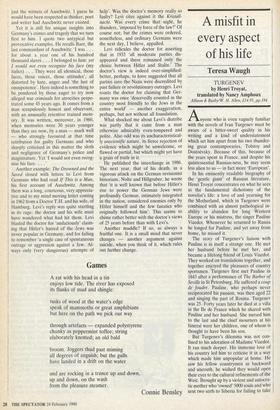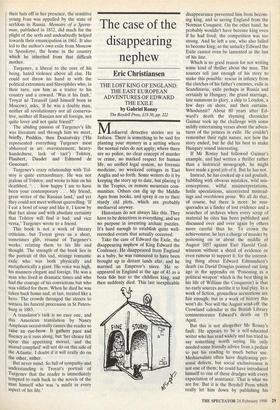A misfit in every aspect of his life
Teresa Waugh
TURGENEV by Henri Troyat, translated by Nancy Amphoux Allison & BusbylW. H. Allen, 114.95, pp.184 Anyone who is even vaguely familiar with the novels of Ivan Turgenev must be aware of a bitter-sweet quality in his writing and a kind of understatement which set him apart from his two thunder- ing great contemporaries, Tolstoy and Dostoevsky. Because of this, because of the years spent in France, and despite his quintessential Russian-ness, he may seem less alien to us — in fact more 'European'.
In his eminently readable biography of the 'gentle giant' of Russian literature, Henri Troyat concentrates on what he sees as the fundamental dichotomy of the novelist's life: a love of and yearning for the Motherland, which in Turgenev were combined with an almost pathological in- ability to abandon for long Western Europe or his mistress, the singer Pauline Viardot. Whenever he returned to Russia he longed for Pauline, and yet away,from home, he missed it.
The story of Turgenev's liaison with Pauline is in itself a strange one. He met her husband before he met her, and became a lifelong friend of Louis Viardot. They worked on translations together, and together enjoyed the pleasures of country sportsmen. Turgenev first met Pauline in 1843 after a performance of The Barber of Seville in St Petersburg. He suffered a coup de foudre. Pauline, who perhaps never reciprocated his passion, was then aged 22 and singing the part of Rosina. Turgenev was 25. Forty years later he died at a villa in the Ile de France which he shared with Pauline and her husband. She nursed him to the last and the chief mourners at his funeral were her children, one of whom is thought to have been his son.
But Turgenev's dilemma was not con- fined to his adoration of Madame Viardot. It ran much deeper. His immense love of his country led him to criticise it in a way which made him unpopular at home. He saw his fellow countrymen as backward and uncouth, he wished they would open their eyes to the cultural refinements of the West. Brought up by a violent and autocra- tic mother who 'owned' 5000 souls and who sent two serfs to Siberia for failing to take their hats off in her presence, the sensitive young Ivan was appalled by the state of serfdom in Russia. Memoirs of a Sports- man, published in 1852, did much for the plight of the serfs and undoubtedly helped towards their emancipation in 1861. It also led to the author's own exile from Moscow to Spasskoye, the home in the country which he inherited from that difficult mother.
Turgenev, a liberal to the core of his being, hated violence above all else. He could not throw his hand in with the political extremists and Slavophiles who, in their turn, saw him as a traitor to his country and a coward. 'Was it his fault,' Troyat ne Tarasoff (and himself born in Moscow), asks, 'if he was a double man, neither all revolutionary nor all conserva- tive, neither all Russian nor all foreign, not quite lover and not quite friend?'
The abiding passion of Turgenev's life was literature and through him we meet, briefly, Pushkin, then Dostoevsky ('He represented everything Turgenev most abhorred in art: overstatement, heavy- handedness, lack of tact') Tolstoy, Flaubert, Daudet and Edmond de Goncourt.
Turgenev's crazy relationship with Tol- stoy is quite extraordinary. He was not jealous of Tolstoy, and wrote to him on his deathbed, `. . . how happy I am to have been your contemporary . . . My friend, great writer of the Russian land,' and yet they could not meet without quarrelling. 'If I eat a bowl of soup and like it, I know by that fact alone and with absolute certainty that ,Tolstoy will find it bad, and vice versa,' Turgenev wrote to a friend.
This book is not a work of literary criticism, but Troyat gives us a short, sometimes glib, résumé of Turgenev's works, relating them to his life and thought. The strength of the book lies in the portrait of this sad, strange romantic exile who was both physically and metaphorically a giant. His voice was high, his manners elegant and foreign. He was a man who lived in dramatic times and who had the courage of his convictions but who was vilified for them. When he died he was taken back home and, at last, treated like a hero. The crowds thronged the streets to Witness his funeral procession in St Peters- burg in 1883.
A translator's task is no easy one, and this American translation by Nancy Amphoux occasionally causes the reader to raise an eye-brow. It gathers pace and fluency as it runs along, but 'her choice fell Upon this appetising morsel, and the morsel complied' will not do on this side of the Atlantic, I doubt if it will really do on the other, either.
But never mind. So full of sympathy and understanding is Troyat's portrait of Turgenev that the reader is immediately tempted to rush back to the novels of the man himself who was 'a misfit in every aspect of his life.'



















































 Previous page
Previous page